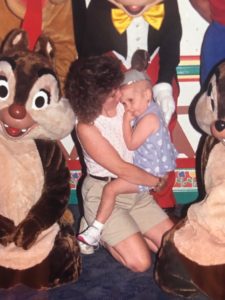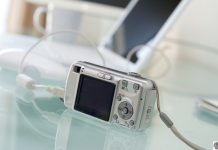Christmas Eve of 1990. My parents’ world fell apart when I was diagnosed with AML Leukemia. Two days later, they were told that I only had a 25% chance of survival. Statistically, I was supposed to die. I’m not sure why I was lucky enough to survive when so many other kids didn’t…when so many other kids still don’t. This month has been Childhood Cancer Awareness Month, and all month long I have seen so many posts bringing awareness to this horrendous disease. I knew I wanted to write about childhood cancer this month, but I honestly don’t remember that much. I was only 3. So I decided to interview my mom Eileen, because nobody knows more about childhood cancer than a mom who fights right alongside their child.
 Can you describe what it was like when you heard the words “your child has cancer”?
Can you describe what it was like when you heard the words “your child has cancer”?
At first, I didn’t believe it could be true, that it was happening. It was like a kick in the gut, and I felt very helpless. For me personally though, I decided to have this attitude of “We’re going to war. We gotta do this, and we will win.”
When you were told my odds of survival, did it change your outlook?
No, it just intensified the feeling of the need to beat it. And I didn’t want to even consider that we’d have to pick out a cemetery plot for you. I just rejected that.
How’d you feel when you were presented with my possible treatment options? Knowing that the plan you chose could affect my possibility of survival? That seems like a lot of pressure.
You immediately started 2 rounds of remission induction, which is pretty standard for kids with AML. We were then approached by a doctor and asked if we wanted to have a computer randomize you as part of a blind study. The computer would randomly pick between you continuing chemo, or you having a self-bone marrow transplant, rather than us making the decision
Self-transplants were brand new and still experimental at the time, and if we had gone that route, we would have needed to go to Seattle or Minneapolis for the transplant. But our entire support system was here in St. Louis. We sat down a couple of days later with your oncologist, and we had a heart-to-heart with him. We asked him what he would do if it were his own child who was sick. Based on his input, we decided to not have the computer randomize you, but rather to continue with the chemo. Once we made this decision, we couldn’t go back and change it. We had to make a choice about your survival, knowing that if we made the wrong one, you would die.
What was the hardest part about watching me go through treatment?
The hardest pare was needing to have blind faith that you were going to be ok. You honestly didn’t look very sick like most of the kids did at the time. You looked robust. We were lucky, because you handled the chemo well. Also, I think your youth played a huge role in how you tolerated treatment in general. You weren’t a teenager or an older kid who knew what was going on, and who realized the severity of the situation. Your attitude was to play, have fun, and be normal.
The mind has an enormous power over the body, and your innocence was a positive factor in helping you get better. Your mindset definitely helped – you were more concerned with jumping on the bed and having fun. The night you were diagnosed on Christmas Eve? You were only concerned about how Santa was going to find you in the hospital.

What was it like when you had to tell people that your child had cancer?
It was hard. It was uncomfortable. People always wanted me to tell them that everything was going to be okay, but I didn’t know if it was or not. So, when I needed to vent and unload, it was hard for people to hear that. It became easier to say that you were doing fine. People wanted to hear something hopeful. A parent should never have to bury their child, it’s so unnatural. It’s so devastating, that even the idea of it, it’s very hard for people to hear.
Did you ever deal with feelings of jealousy when you would see a mom with a healthy child?
Maybe? But mostly I was able to accept what was happening. Accepting it was the only way I could cope. You go through it…you feel it…but then you have to move on. You can’t stay that way. It would really bother me though when people would stare at you – that was the hardest. Kids would stare and point and say “look mom, she doesn’t have any hair,” and that was really hard.
What was it like being told I was in remission?
Joyous. Grateful. Lucky. But for many years after, we still had to worry more than the parent of a healthy child. We had to go back for regular checkups at Children’s to make sure that you were still cancer-free. And the anxiety of each of those visits? Indescribable.
What would you want to tell other moms? Especially those who are currently going through what you went through?
If your child has cancer, do your homework and make the best decision that you can as a family. Go to a top institution. The most important thing is your mindset. You definitely have to feel comfortable with your doctor, and with the medical decision that you have made. The feelings of hopelessness and fear can overwhelm you. You have to be strong for your family, you have to be strong for your child – in particular as their mother. You cannot be weak. It’s so easy to be overwhelmed by the feelings of negativity, especially when looking at the percentages. But your kid is always watching you. You have to get up, and take them to treatment, al while being composed. You can’t break down.
– – – – – – – – – – – – – – – – – – – – – – – – – – – – – – –
Only 4% of federal government cancer research funding goes to study pediatric cancer. I deserved more than 4%. Every sick kid in this country deserves more than 4%. As hard as it is to talk about children with cancer, September has been an opportunity to do just that. So please, even when September ends, continue to talk about it. Keep talking about it, and don’t stop until something changes.










